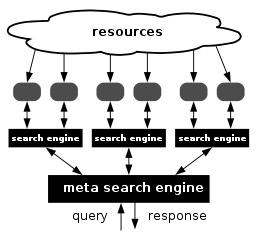- Metasearch engine
-
A metasearch engine is a search tool[1] that sends user requests to several other search engines and/or databases and aggregates the results into a single list or displays them according to their source. Metasearch engines enable users to enter search criteria once and access several search engines simultaneously. Metasearch engines operate on the premise that the Web is too large for any one search engine to index it all and that more comprehensive search results can be obtained by combining the results from several search engines. This also may save the user from having to use multiple search engines separately.
The term "metasearch" is frequently used to classify a set of commercial search engines, see the list of search engines, but is also used to describe the paradigm of searching multiple data sources in real time. The National Information Standards Organization (NISO) uses the terms Federated Search and Metasearch interchangeably to describe this web search paradigm.
Contents
Operation
Metasearch engines create what is known as a virtual database. They do not compile a physical database or catalogue of the web. Instead, they take a user's request, pass it to several other heterogeneous databases and then compile the results in a homogeneous manner based on a specific algorithm.
No two metasearch engines are alike. Some search only the most popular search engines while others also search lesser-known engines, newsgroups, and other databases. They also differ in how the results are presented and the quantity of engines that are used. Some will list results according to search engine or database. Others return results according to relevance, often concealing which search engine returned which results. This benefits the user by eliminating duplicate hits and grouping the most relevant ones at the top of the list.
Search engines frequently have different ways they expect requests submitted. For example, some search engines allow the usage of the word "AND" while others require "+" and others require only a space to combine words. The better metasearch engines try to synthesize requests appropriately when submitting them[citation needed].
See also
- For engines, see the list of search engines
References
- ^ Sandy Berger's Great Age Guide to the Internet By Sandy Berger. Que Publishing, 2005, ISBN 0789734427.
External links
- Metasearch at the Open Directory Project
- Guide to Meta-Search Engines by UC Berkeley libraries with recommendation not to use them for serious research.
- Meta-search: More heads better than one? Argument against Berkeley's negative recommendation
Tools Local search · Vertical search · Search engine marketing · Search engine optimization · Search oriented architecture · Selection-based search · Social search · Document retrieval · Text mining · Web crawler · Multisearch · Federated search · Search aggregator · Index/Web indexing · Focused crawler · Spider trap · Robots exclusion standard · Distributed web crawling · Web archiving · Website mirroring software · Web search query · Voice search · Human flesh search engine · Natural language search engine · Web query classificationApplications Protocols and standards Z39.50 · Search/Retrieve Web Service · Search/Retrieve via URL · OpenSearch · Representational State Transfer · Website Parse Template · Wide Area Information ServersSee also Categories:- Internet search engines
Wikimedia Foundation. 2010.

